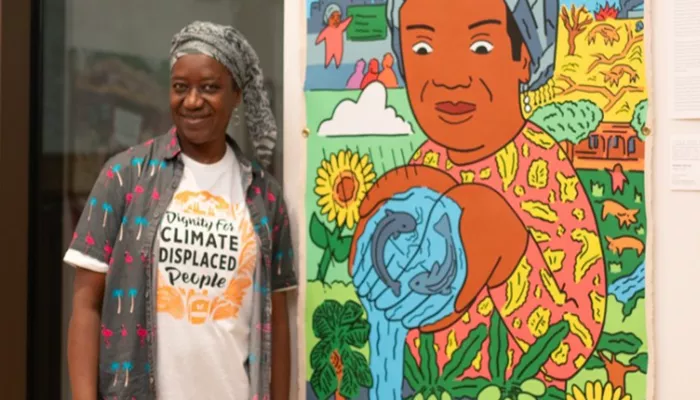Climate Change Fuels Migration Crisis: Immigrants in New York Face Uncertain Future.
Malado Barro, a Mali-born immigrant living in New York, has felt the harsh reality of climate change firsthand. As a child in Sikasso, she helped her father, a farmer, cope with the daily struggle for water to sustain their crops and livestock. Severe droughts during her early years made water incredibly scarce, causing immense stress for her family.
“I saw how we had to struggle to get water for our animals to even have a drink. It was hard. Everybody was suffering,” Barro recalled.
Barro’s experience is now becoming more common. Many migrants arriving in New York, particularly from Africa, have left their homes because climate change has made it difficult to live and work safely. Advocates warn that the upcoming presidential election could further impact these migrants’ futures, with concerns that political outcomes may worsen their situation.
Rising Xenophobia and Climate Change Impact
Ahmed Gaya, director of the Climate Justice Collaborative at the National Partnership for New Americans, expressed concerns about the political climate. While his organization does not endorse specific candidates, he noted the rising xenophobia influencing political discourse.
“We are in a moment of rising global authoritarianism, driven by xenophobia,” Gaya said. “These movements neither want to solve climate change nor support displaced people by providing them safe pathways.”
With the U.S. presidential election days away, former President Donald Trump’s campaign centers on sealing the border and deporting immigrants. While Trump has not yet outlined an official climate policy, his focus on immigration during his previous term caused family separations and affected both undocumented individuals and valid visa holders.
In contrast, Vice President Kamala Harris, the daughter of immigrants, is seen as pro-immigrant but has recently emphasized border security.
Election Uncertainty Adds to Migrant Stress
Advocates worry about the impact of the election on migrants awaiting asylum hearings. A potential shift in policy could force many to return to their climate-ravaged home countries. Since 2022, over 214,600 undocumented migrants have arrived in New York, many fleeing political instability or environmental crises. However, discussions on the climate’s role in migration remain limited.
Melissa Johnson, New York organizer for The Black Alliance for Just Immigration, highlighted how African immigrants, especially, are often overlooked in discussions about climate change and migration.
“The stories about climate disaster and its impact on Black communities are not told enough,” Johnson said.
The Intersection of Climate Change and Socio-Political Instability
Patience, an asylum-seeker from Cameroon, described how both climate change and war drove her to flee her country. After facing kidnapping attempts and threats to her life, she sought refuge in the U.S. But climate change also affected her family directly, with extreme heat and lack of water impacting her children’s health.
“Climate change is real, and it’s affecting everyone,” she said. “We need pathways for people to migrate freely because of climate change, which is one of the main causes of migration.”
Patience, an academic by training, faced criticism in Cameroon for speaking out about the challenges of climate change. Despite being viewed as a complainer, she advocated for herself and other mothers experiencing similar hardships.
Migration as a Necessary Response to Climate Change
Experts warn that climate change may cause further social, economic, and political instability, forcing more migrants to seek refuge. Gaya emphasized that migration is an essential form of climate adaptation.
“Some people will not be able to remain in their homes, and we need to provide them a safe pathway,” Gaya said.
However, he pointed out that climate change remains a “blind spot” for U.S. politicians and policymakers. Immigrants from climate-impacted regions, including African and Caribbean nations, make up a significant portion of New York’s migrant population. In 2023 alone, 58,000 migrants from African nations arrived, making up 15% of the total, according to The New York Times.
Urgency for Comprehensive Policy Change
Advocates are calling for federal policy changes that recognize climate change as a legitimate factor for asylum and immigration. They argue that deporting individuals back to their home countries, often devastated by climate-related disasters, only puts them in further danger.
“We must continue to advocate to end immigrant detention, stop deportations, and help people return to their communities and families,” Johnson urged.
As climate disasters intensify, the need for comprehensive immigration reform that addresses climate change as a driving force behind migration will likely become more urgent. Advocates emphasize the importance of providing a safe pathway for those fleeing the consequences of climate violence.
Related topics:
- MD Ethics Committee Refuses to Classify Judges’ U Visa Certifications
- 1 Million U.S. Passports Renewed Online Since September
- Canada to Reduce Immigration Numbers, Says Government Source


